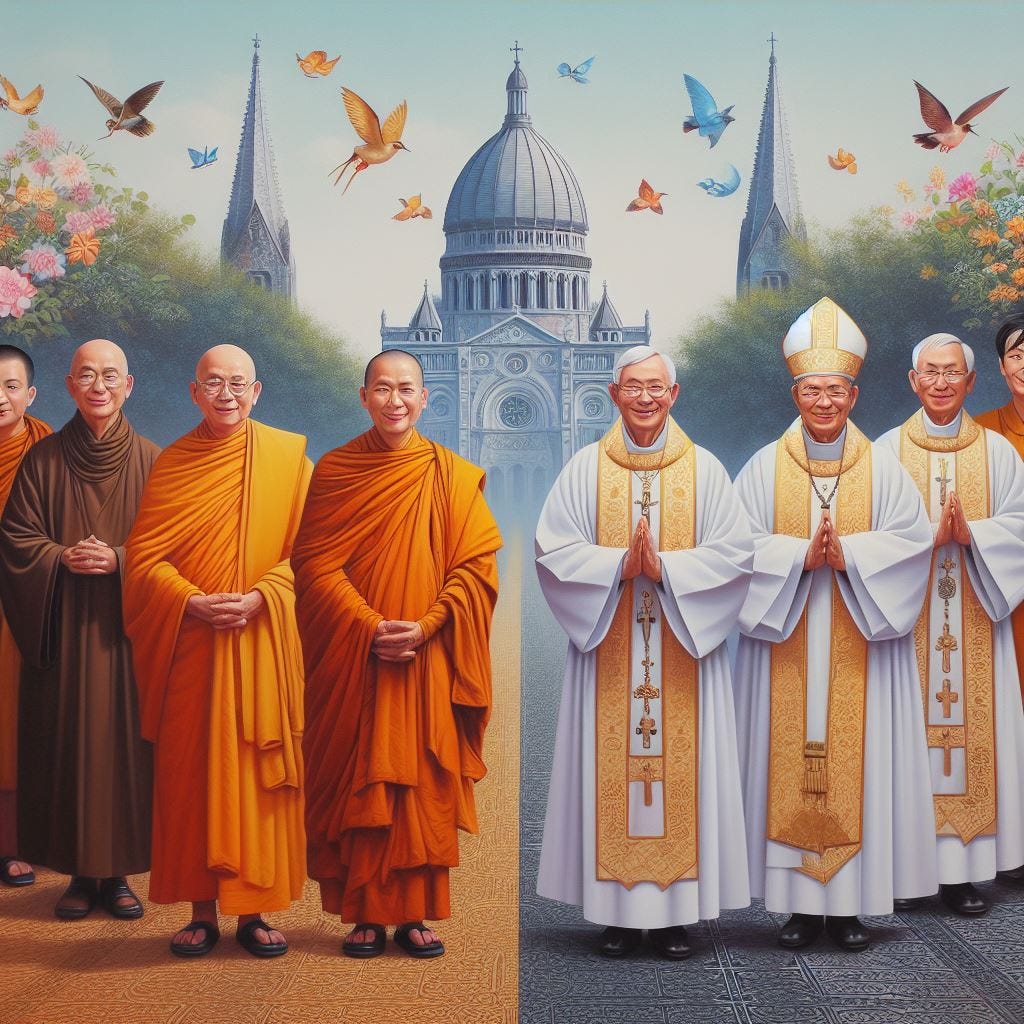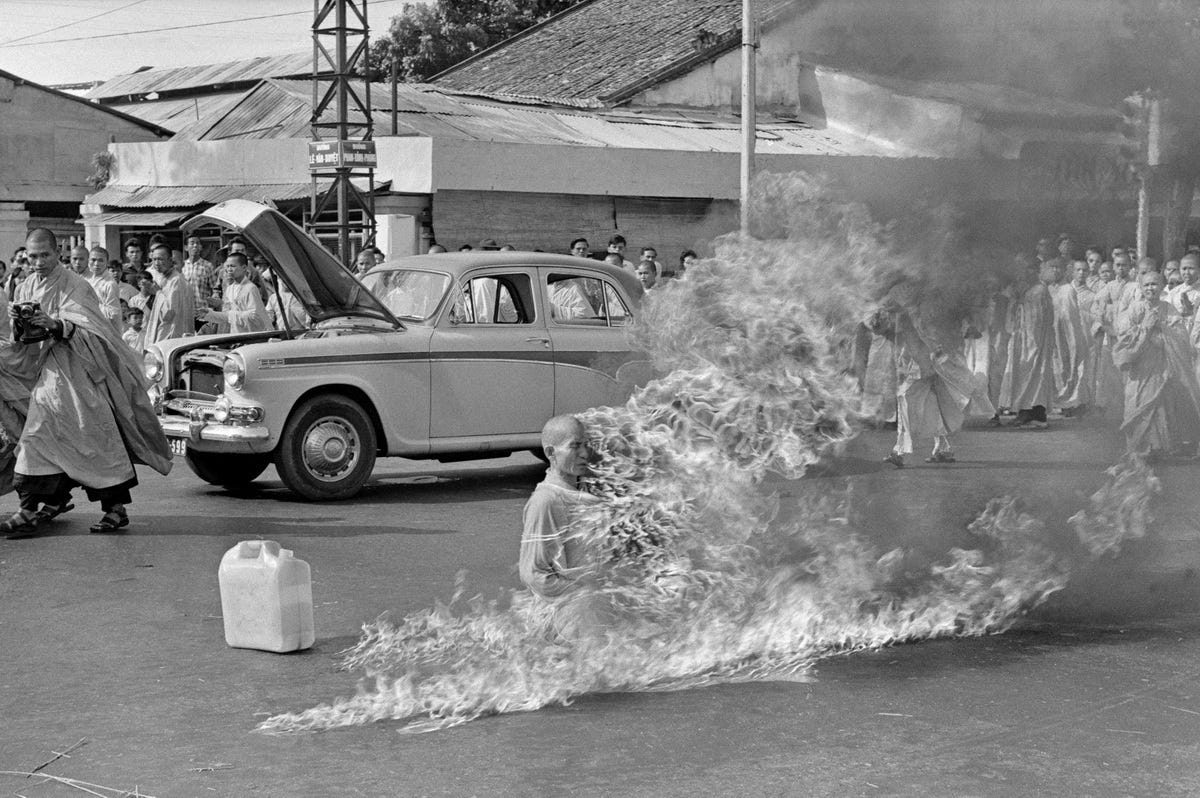Why did Vietnam embrace religion while other Communist countries didn't?
This is very strange, if you think about it. Both Russia and China were hostile toward religion. Karl Marx is famous for his distain of religion when he calls it “the opiate of the masses”.
The Soviet Union was the first state with the objective of complete elimination of the existing religions. During the Stalinist era, 1929-1953, the government became openly hostile toward people engaging in organized religious worship.
Mao’s China took this to a whole new level during the Cultural Revolution. Mao introduced a campaign to eliminate the “four olds”; “old things, old ideas, old customs and old habits.” This effectively eliminated religion as all religious activities were banned. The Chinese Communist Party attacked or destroyed many temples, shrines, churches and mosques, and some religious buildings were abandoned, closed or confiscated. Those who dared to continue to practice religion would need to do so in secret from the privacy of their own homes. This posed great risk, as sometimes, even family members would be “compelled” to turn on other family members if targeted by local police or government officials. This attitude continues today, as there are reports of religious persecution still practiced in China.
A bit of History about Christianity in East Asia
Historically, it is easy to understand why the Chinese were hostile toward Christianity. The monks, priests and missionaries were the vehicle that foreign spies would enter the country. Once there, these spies would often start to organize political movements which were covertly or openly hostile toward the existing government or would undermine the culture. This happened all over East Asia, from Japan, China, Vietnam …everywhere.
The pattern of civil unrest caused by religious actors would always happen the same way. First the government would support local missionaries. Then the local missionaries would entrench themselves in the local culture. This was a back door to allow foreign merchants into the country. Once the merchants were there, European governments weren’t far behind.
Some governments saw what was happening and became openly hostile toward missionaries. In the 16th century, Japan banned all missionaries and on February 5, 1597 killed the 26 “martyrs of Japan” driving Christianity underground.
Religious agents were a destabilizing influence on eastern societies. With these monks and priests came European political thought along with European style economics. Shortly after the merchants, came European vices, such as the introduction of opium.
Europeans would try to change local customs and laws. Sometimes these religious leaders would actually be foreign agents working to undermine the local government by arranging revolutions. They would threaten national unity and these East Asian countries would be forced to kick the Europeans out. When these religious practitioners were kicked out, they would go to their home country and / or parish and complain to more powerful European powers. Europeans would send back their military to compel these East Asian countries to allow merchants and religious leaders back into their country.
In the case of China, European powers took pieces, where agents would set up offices in major cities or take small port cities as a base of their trade. When the Chinese tried to kick out the British, due to the corruption of their citizens by British opium imports from India. British sent ships to go to war with the technological inferior Chinese navy. When the Chinese lost the war, they were forced to make economic concessions, allowing European merchants to operate freely.
Other East Asian countries were not so lucky. Less cohesive governments like Indonesia, Vietnam or the Philippines, found themselves targeted by a European governments, who would take advantage of fragile monarchies or decentralized tribal societies and take over. In the case of Vietnam, the French kept the monarchy in place and simply replaced the administrators with their own.
Why did Vietnam Embrace Religion?
It is easy to understand why East Asian as well as Communists felt uneasy about religion. But why did Vietnam support local religion?
This question isn’t so easy to answer. Basically there were two dominant religions in Vietnam during the French colonial era. There were the Catholics and the Buddhists. The Catholics were mostly administrated my European priests and were typically supportive of the European government. The Buddhists tended to not support the French administration. They were always having trouble with the French and sometimes found themselves in the middle of open hostility from the French government.
The Buddhists have always had ties with independent Vietnamese government dating back to 1005 CE (AD if you are old school) under the Ly dynasty after Ngo Quyen terminated Chinese rule. Rather than the Chinese concept of “Mandate of Heaven”, the Ly kings followed the lead of early Buddhist monarchs around South East Asia who focused on the welfare of the people and valued compassion.
The Ly kings sought a return to the traditional ways by inserting themselves into the Hung King cult, starting with ancestorial lineage and inserting the Ly dynasty into the Hung mythology. They resorted the traditional cultural practices which irritated the traditional Han leadership of long hair, tattoos and betel nut chewing to name a few. The major change was the restoration of the rights and responsibilities of Vietnamese women, who now played a much larger role in Vietnamese society. This difference between Han and Vietnamese culture signaled the earliest division between how Chinese and Vietnamese leadership thought of religion.
These tensions continued after the French left, with the Catholic minority seizing control of the American backed Southern Republic. The Buddhists were always the religion of poor farmers, so a split along governance lines was predictable. The Catholics took control of the government. This religious tension, split among economic as well as religious lines, started to manifest in persecution of the poorer majority. Many poor revolutionaries, would stand up to the American backed Republic, to be shipped to prison camps on islands around the south. These places were horrible, where people were left in the hot sun all day in small “Tiger cages” covered in barbed wire. If they still had any fight left in them, they would be starved and / or beaten, sometimes to death.
With this dynamic in mind, Ho Chi Minh saw an opportunity to unite the nation against the Americans if he could win over the religious factions. Buddhists were easy allies as their interests of independence aligned with the Communists. Instead of only accepting Buddhist support, Ho Chi Minh did something unexpected, when he passed a government decree protecting religious freedom and recognized The Vatican’s religious authority within the Catholic network of Vietnamese Catholic churches.
The Catholic line at the time, virulently anti-communist, allied with the policies of the Southern government. Diệm (the President of the Republic of South Vietnam) was staunchly Catholic. He had a brother who was an archbishop and Diệm had considered a life in the priesthood before entering politics. Even though the Catholics were supporting the South, the North gave an opening for Catholics within a Vietnamese society after the war ended. If you would like to read more, here is an interesting article about Vietnamese Catholicism.
This religious tolerance goes back to Ho Chi Minh’s objectives when he left Vietnam to petition the French and Americans for Vietnamese autonomy. His priorities were always patriotism first. He wanted Vietnam to regain their autonomy. His second priorities were governance. He didn’t necessarily want to form a Communist government, but when he was turned down by Western powers, he saw it as the only direction left to turn to. He wasn’t so firm in political systems as he was in national unity. Although Communists tend to not be religious, Vietnam is religious and he needed to deal with the realities on the ground. When he observed the nature of the Vietnamese people, it was better to embrace religious beliefs to unite the people. Basically, he chose unity over ideology.
This belief stuck and the northern Vietnamese found a strong ally among the Buddhist community. In the early days of the war, nearly a dozen monks decided to self immolate. One of those monks, Thích Quảng Đức has a memorial in the middle of Ho Chi Minh City commemorating this 1963 event. This was likely a major factor that cost America the war in the minds of many university students around the U.S. because this emotional image gave many university students the idea that America was on the wrong side as Johnson escalated the ground war in the following years. This moment led to increasing University protests. The immolation was widely reported on American evening news programs and magazines and was a contributing factor in addition to the Tet offensive which prompted Walter Cronkite to declare the Vietnam War to be unwinnable on February 27th, 1968. From this moment on, the American government lost support of many of the American people and it was just a matter of time before the war would wind down, with American’s leaving.
The Buddhist community has continued to aid the government. I recall a time during Covid when the government was having trouble raising enough money to support the poor during the early Covid lock downs. A senior government official met with an important monk and asked for help. This monk calmly talked publicly about the country banding together to support each other during this time of crisis. Problem solved. All needed aid money was collected a short while later, plus a surplus.
Ho Chi Minh’s vision of government and religious figures working together has proven to be an effective strategy in giving the country of Vietnam unity. This cohesiveness has made Vietnam stronger and helped them as they have gone through difficult times. It’s a strange lesson to learn that an effective leader will let ideology take a back seat to the unity of the nation.





I’ve been here for 10 years and have never really thought about this, perhaps because I am an unreligious person. It was very interesting, thank you.